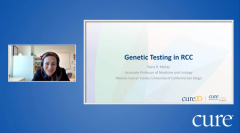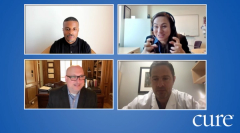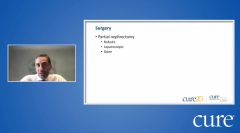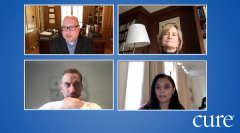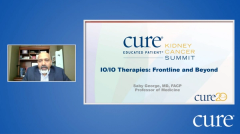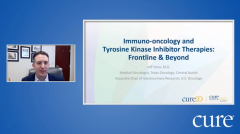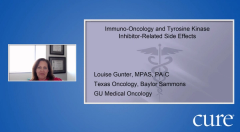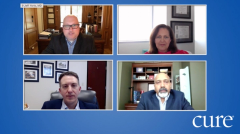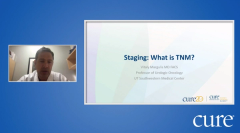
Educated Patient® Kidney Cancer Summit IO/TKI-Related Side Effects Presentation: April 9, 2022
Watch Louise Gunter, from Texas Oncology, discuss IO/TKI-related side effects, during the CURE Educated Patient Kidney Cancer Summit.
Episodes in this series

Immunotherapy and tyrosine kinase inhibitors (TKIs) are “powerful drugs,” and often come with side effects that patients with kidney cancer should be aware of, explained Louise Gunter during the CURE® Educated Patient® Kidney Cancer Summit
“As the side effects declare themselves, we try to manage them with other medication until they become too severe or impact your quality of life. And then the dose will be reduced. Two-thirds of patients will have a dose reduction, so don’t be discouraged by this. Expect it,” Gunter, a physician’s assistant at Texas Oncology, said in her presentation at the summit, held April 9, 2022.
Immunotherapy Side Effects
Immunotherapy drugs work by turning on the immune system and helping it to recognize — and therefore attack — cancer cells. In doing so, these drugs cause inflammation, which can affect any organ in the body.
“If things get too inflamed, we can give you some steroids to be used as an antidote to calm things down. But it’s very important that you tell (the health care team) how you’re feeling right away,” Gunter said.
Gunter explained that inflammation of the skin can cause rash, while inflammation in the joints will lead to patients feeling pain in their muscles and joints. When patients experience inflammation in their digestive tract, they may feel nausea or have diarrhea, while inflammation of the lung will cause cough, shortness of breath and wheezing. In addition, abdominal pain, yellowing eyes or dark urine may be signs of liver inflammation.
TKI Side Effects
TKI drugs, which work by blocking certain proteins on kidney cancer cells, causing them to die, have their own set of side effects that patients should be aware of, too.
Most commonly, patients on TKIs may experience fatigue, high blood pressure, diarrhea, decreased appetite, nausea and vocal changes. Gunter said that serious side effects are rare (occurring in about 4% of patients), but possible. They include bleeding, blood clots and injury to the kidney or liver.
Similar to immunotherapy side effects, open communication with the treatment team is key.
“The most important thing we can do is intervene early. You are not being a burden to us (by contacting us). We want you to call your team,” Gunter said. “The earlier we know about what you’re experiencing, the easier you will be to treat. We will use other medicines to optimize your ability to tolerate these drugs before we reduce your dose.”
How to Manage Common Side Effects
Cancer treatments, pain medications or even the disease itself can all lead to fatigue. Gunter recommends establishing a baseline at the beginning of treatment so that patients and their clinicians can monitor if the fatigue is getting significantly worse.
Regarding fatigue management, Gunter recommends exercise and a healthy diet.
“Exercise is always great, but just as tolerated. I’m not talking marathons — walking outside when the weather is nice and moving around the house is important. Keeping up with nutrition is (also) critical, (as is)…alternating activity with rest.”
Gunter also said that about one-third of patients will experience nausea/vomiting as a result of cancer treatment. Here, the main goal is to avoid vomiting, which can make patients dehydrated (as can diarrhea) and can be harmful to the kidneys.
“Do not try to tough this one out,” Gunter said, noting that if patients are feeling nauseated, they may be prescribed a drug called Zofran (ondansetron). “I’ve had patients tell me ‘I’ve been vomiting for three days,’ and they haven’t even started to take their nausea medicine yet. We do not want that to happen.”
Additionally, eating smaller meals consisting of bland foods can help, though patients may experience decreased appetite.
“If you can’t finish a meal, or if you can’t even eat at all, I recommend patients get Boost or Ensure supplements over the counter. Try to get the one with the highest protein (content) in it… a lot of patients will smile when I suggest adding ice cream or even making (meals) into a milkshake.”
Ultimately, it is essential that patients communicate with their clinicians to ensure that they feel as good as possible through their cancer treatment.
“The goals of therapy are not only to extend your life, but also to maintain your quality of life,” Gunter said.
For more news on cancer updates, research and education, don’t forget to

